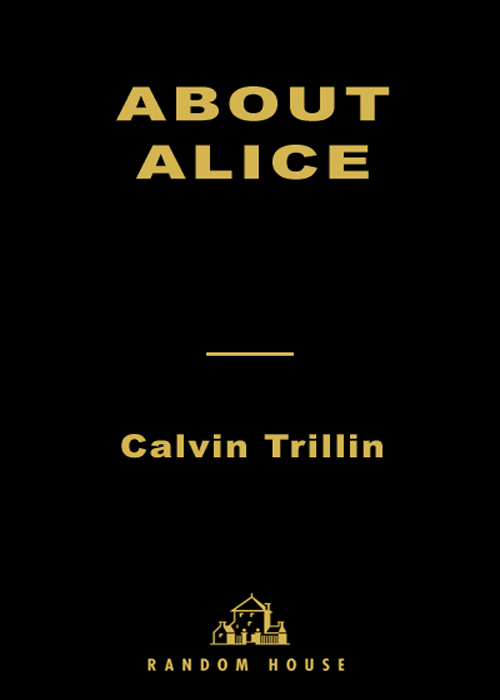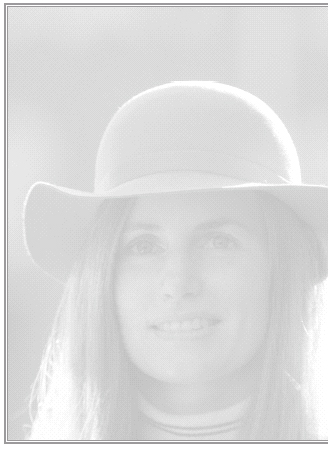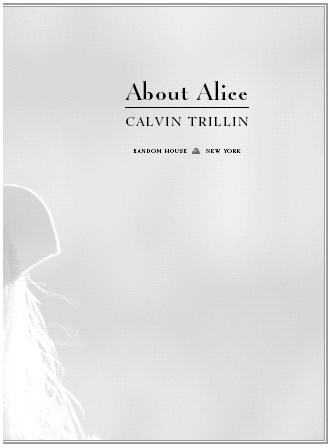About Alice



CONTENTS
Excerpt from Quite Enough of Calvin Trillin
For our grandchildrenâ
Izzy and Toby and Rebecca and Nate
I
Now that it's fashionable to reveal intimate details of married life, I can state publicly that my wife, Alice, has a weird predilection for limiting our family to three meals a day.
âAlice, Let's Eat
There was one condolence letter that made me laugh. Naturally, a lot of them made me cry. Some of those, oddly enough, were from people who had never met Alice. They had become familiar with her as a character in books and magazine pieces I'd writtenâlight books and magazine pieces about traveling or eating or family life. Virtually all those letters began in the same way, with a phrase like “Even though I never really knew Aliceâ¦.” I was certain of what Alice's response would have been. “They're right about that,” she would have said. “They never knew me.”
I once wrote that tales about writers' families tend to have a relation to real life that can be expressed in terms of standard network-television fare, on a spectrum that goes from sitcoms to Lifetime movies, and that mine were sitcoms. Now that I think of it, maybe they were more like the Saturday-morning cartoons. Alice played the role of the momâthe voice of reason, the sensible person who kept everything on an even keel despite the antics of her marginally goofy husband. Years ago, at a conference of English teachers where we were both speakers, the professor who did the introductions said something like “Alice and Bud are like Burns and Allen, except she's George and he's Gracie.” Yes, of course, the role she played in my stories was based on the role she played in our familyâour daughters and I sometimes called her T.M., which stood for The Motherâbut she didn't play it in the broad strokes of a sitcom mom. Also, she was never completely comfortable as the person who takes responsibility for keeping things on an even keel; that person inevitably misses out on some of the fun. (“I feel the need to break out of the role of straight person,” she said in a
Nation
review of
Alice, Let's Eat
that cautioned readers against abandoning long-planned European vacations in order to scour the country for “the perfect roast polecat haunch.”) The sitcom presentation sometimes made her sound stern as well as wise, and she was anything but stern. She had something close to a child's sense of wonderment. She was the only adult I ever knew who might respond to encountering a deer on a forest path by saying, “Wowsers!”
Once, during a question-and-answer period that followed a speech I had given at the Herbst Theatre, in San Francisco, someone asked how Alice felt about the way she was portrayed in my books and articles. I said that she thought the portrayal made her sound like what she called “a dietitian in sensible shoes.” Then the same questioner asked if Alice was in the audience, and, when I said she was, he asked if she'd mind standing up. Alice stood. As usual, she looked smashing. She didn't say anything. She just leaned over and took off one of her shoesâshoes that looked like they cost about the amount of money required in some places to tide a family of four over for a year or twoâand, smiling, waved it in the air. She wasn't a dietitian in sensible shoes, and she would have been right in saying that the people whose exposure to her had been through my stories didn't know her. Still, in the weeks after she died I was touched by their letters. They may not have known her, but they knew how I felt about her. It surprised me that they had managed to divine that from reading stories that were essentially sitcoms. Even after I'd taken in most episodes of
The Honeymooners,
after all, it had never occurred to me to ponder the feelings Ralph Kramden must have had for Alice Kramden. Yet I got a lot of letters like the one from a young woman in New York who wrote that she sometimes looked at her boyfriend and thought, “But will he love me like Calvin loves Alice?”
The letter that made me laugh was from Roger Wilkins. By the time of Alice's death, Roger occupied a chair of history and American culture at George Mason University, but in the seventies he had been on the editorial board of
The New York Times.
In that period, I'd sometimes join the regular lunches he had with the late Richard Harrisâa remarkable investigative reporter for
The New Yorker
who had the aggressively unsentimental worldview often found among people in his line of work. Alice and Roger became acquainted when she accompanied me to a conference I was covering in New Orleans. In off hours, when we'd gather around the hotel swimming pool, she and Roger sometimes had long, serious conversations. It wasn't unusual for me to find Alice having long, serious conversations with people I'd been bantering with for years. She got engaged with people's lives. If she said to a friend's son or daughter, “How's school?” she wasn't just being polite; she wanted details, and she wasn't shy about offering advice. If people we were visiting mentioned that they'd been thinking about renovating their house, Alice was right on the case, room by room. In such architectural conversations, she could get bossy, and sometimes I felt obliged to warn our hosts that one of her characteristic gesturesâthe gesture she used when she was saying something like “You have to open all of this up”âwas remarkably similar to the gesture you'd use to toss money into the wind.
She wasn't among those whose response to tragedy or loss was limited to offering the conventional expressions of sympathy before moving on with their own lives. In 1988, an old friend phoned us to say that his grown daughter, a young woman we'd known since she was a child, had been raped by an intruder. This was a dozen years after Alice had been operated on for lung cancer, and among the things that she wrote to our friend's daughter was that having lung cancer and being raped were comparable only in that both were what she called “realizations of our worst nightmares.” She said that there was some relief at surviving what you might have thought was not survivable. “No one would ever choose to have cancer or to be raped,” she wrote. “But you don't get to choose, and it is possible at least to understand what Ernest Becker meant when he said something like âTo live fully is to live with an awareness of the rumble of terror that underlies everything,' or to begin to understand the line in âKing Lear'ââRipeness is all.' You might have chosen to become ripe less dramatically or dangerously, but you can still savor ripeness.” Alice had a large envelope in which she kept copies of letters like thatâalong with copies of some letters she had sent the girls and copies of poems we had written for her on birthdays and documents like the announcement of a prize for community service that Abigail, our older daughter, had been awarded at Yale and an astonishing letter of recommendation that a professor had provided for Sarah, our younger daughter, when she applied for her first job after getting her M.S.W. On the envelope was written “Important Stuff.”
In his condolence letter, Roger talked partly about that engaged quality in Alice, but he also got around to her appearance. “She was nice and she was concerned and she was smart and when she talked to you, she was thinking about you, and, also, she was so very pretty,” he wrote in September of 2001, a few days after Alice died. “I always thought of you as a wonderful guy, but still I couldn't figure out how you managed to get Alice. Harris once told me it was just dumb luck.” When I read that, I burst out laughing. Harris had nailed it again.
II
When approached by young people in search of wisdom about how they might go about linking up with someone with whom they are likely to enjoy a long and happy marriage, the only strategy I can divine from what passed for my wife-seeking activities is “Wander into the right party.”
âFamily Man
The party was thrown in late 1963 by
Monocle,
a doomed magazine of political satire.
Monocle
's parties seemed to grow more elaborate as its financial situation became increasingly bleak. Three or four other couples with connections to
Monocle
met and eventually married; those unions, which we called “
Monocle
marriages” in our house, were all long-lasting. I have reminded the founder of
Monocle
âVictor Navasky, who is fortunate enough to have a
Monocle
marriage himselfâthat his brainchild proved to be more durable as a marriage brokerage than as a magazine. In Alice's view,
Monocle
had existed in order to get everyone married, a project that might well require larger and larger parties, and, once that had occurred, it quite naturally folded.
When I saw Alice at that
Monocle
party, she was wearing a hat. At least, I've always remembered her as wearing a hat. She later insisted that she'd never owned a hat of the sort I described. Maybe, but I can still see her in the hatâa white hat, cocked a bit to the side. Her cheeks were slightly flushed. She had blond hair, worn straight in those days, and a brow just a shade darker than her hair. (Our oldest grandchild, Isabelle Alice, who was born in 2002, has precisely that coloring, which may be one reason I sometimes have trouble taking my eyes off her.) Whether or not Alice was wearing a hat was not the only difference in the way we recalled that meeting. Alice's father had grown up in rural North Carolina, in a Southern Baptist family named Stewart, but her mother was Jewishâa fact that was to come as a great relief to my own Jewish mother, once I reminded her that, according to the ancient Hebraic belief in matrilineal descent, anyone whose mother was Jewish is herself Jewish. Although some people thought that Alice looked like the quintessential
shiksa,
I always claimed that when I spotted her across the room that night I asked Navasky, “Who's that cute little Jewish girl over by the punch bowl?” Alice always said that I'd made up that story and that, furthermore, there wasn't any punch bowl.
She was, as Roger Wilkins later wrote, so very pretty, but that wasn't the first thing that struck me about her; it might have come as much as two or three seconds later. My first impression was that she looked more alive than anyone I'd ever seen. She seemed to glow. For one reason or another, I barely got to speak to her that evening. Two weeks later, though, after doing some intelligence work and juggling some obligations and dismissing as hearsay the vague impression of one mutual acquaintance that Alice was virtually engaged, I dashed back from a remote suburb to a party that I figured she'd be attending. So I couldn't claim that I just wandered into that second party; in romantic matters, even those who need to depend mainly on dumb luck are usually up to one or two deliberate moves. At the second party, I did get to talk to her quite a lot. In fact, I must have hardly shut up. I was like a lounge comic who had been informed that a booker for
The Tonight Show
was in the audience. Recalling that party in later years, Alice would sometimes say, “You have never again been as funny as you were that night.”
“You mean I peaked in December of 1963?” I'd say, twenty or even thirty years later.
“I'm afraid so.”
But I never stopped trying to match that eveningânot just trying to entertain her but trying to impress her. Decades laterâafter we had been married for more than thirty-five years, after our girls were grownâI still wanted to impress her. I still knew that if I ever disappointed her in some fundamental wayâif I ever caused her to conclude that, after all was said and done, she should have said no when, at the end of that desperate comedy routine, I asked her if we could have dinner sometimeâI would have been devastated.
A year before Alice died, I read an obituary in
The New York Times
of Mary Francis, who had been married to the English mystery novelist Dick Francis for fifty-three years. “I don't think I shall write again other than letters now,” Dick Francis was quoted as saying. “So much of my work was her.” Apparently, Mary Francis had been such an active participant in her husband's work, particularly in the matter of research, that he considered the novels a joint effort. She had been well educated, and Dick Francis was conscious of being a novelist who had left school at fifteen to become a jockey. The article implied that he might not be able to produce a book without her help. But I read his reluctance to write novels without her another way. As I understood what he was saying, she was the one he'd been trying to impress.
I showed Alice everything I wrote in rough draftâpartly because I valued her opinion but partly because I hoped to impress her. If the piece was meant to be funny, the sound of laughter from the next room was a great reward. The dedication of the first book I wrote after I'd met her, a collection of comic short stories, said, until I decided that the last few words were too corny, “These stories were written for Aliceâto make her giggle.” When I wrote in the dedication of a book “For Alice,” I meant it literally. In that sense, the headline on her obituary in the
Times
was literally true, as well as in the correct order: it described her as “Educator, Author and Muse.” When Alice died, I was going over the galleys of a novel about parking in New Yorkâa subject so silly that I think I would have hesitated to submit the book to a publisher if she hadn't, somewhat to her surprise, liked it. When the novel was published, the dedication said, “I wrote this for Alice. Actually, I wrote everything for Alice.”